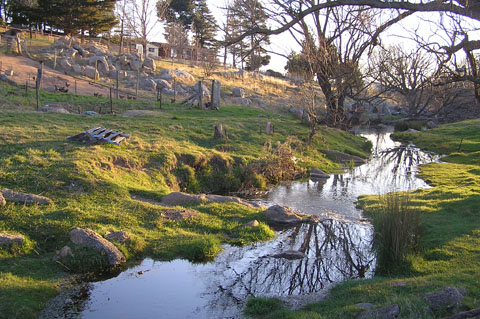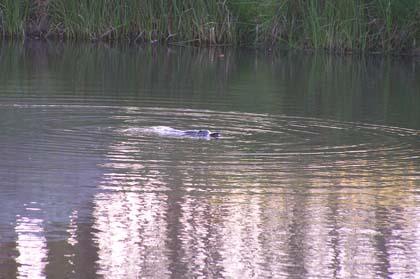
After years of fantasising about a weekender in the country, my husband and I finally bought a little cottage overlooking a creek on the outskirts of an historic town. It's a long drive from the Big Smoke, but we didn’t let a practicality like that stop us. After all, we had fallen in love with the town and its old buildings, its green hillsides and most particularly, the platypus that lived in the creek. As if by special request of the real estate agent, the creature had even made an appearance on the very day we inspected the house, providing the ‘wow factor’ which clinched the deal.
Some years later, the platypus is still with us, though I’m not certain whether it’s our original one or not. I’d like to think so. There’s been a baby too, otherwise known as a puggle. A tiny version of its parent, yet full of bravado, floating on the surface and enjoying the sun. Then again, a fully grown platypus isn’t very big – about 40 to 60cm, the experts say.
When we arrive at our cottage on a Friday afternoon, the platypus is usually waiting for us. Tired after the long car trip, we are instantly heartened by his presence, foreshadowed by neatly concentric ripples on the surface of the creek. Then we spot the curve of his back as he duck-dives for food. Sometimes he will move on quickly, but often he lingers and we watch him from behind a stand of reeds.
A couple of years ago, our slow-moving creek turned into a raging torrent after a heavy rainfall upstream. Willow trees cracked under the force of the water. Debris came hurtling past at a frightening speed. Creek banks were reconfigured by the tempest. As I stood in the rain, watching the creek rise, all I could think about was the platypus. What would happen to his burrows scattered at intervals along the banks? Would the little guy be washed away altogether? Panic struck as I recalled a story I’d read in a newspaper about a puggle found in the breakers of a South Coast beach. He had been washed all the way to the ocean by floodwaters.
So what became of our platypus?
By the next day, the water level had dropped and the creek was moving slowly again. Rubbish and tree branches had piled up against the stand of willows in front of our cottage. New pools had appeared and the course of the creek had altered. Oh dear, I thought. If the banks are gone, so are the burrows. I went and made myself a cup of tea and by the time I returned to the window, there he was, cavorting as if there had never been a flood.
Including a platypus in my book MR CHEN’S EMPORIUM seemed like a natural thing to do. In the novel, as in real life, he’s like a magician’s assistant, appearing from nowhere and vanishing just as quickly. All that’s missing is the puff of smoke.
Deborah O’Brien
February, 2012

